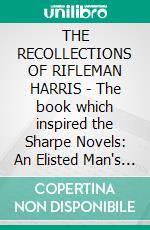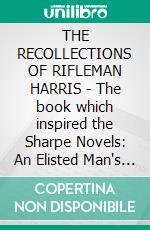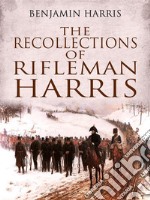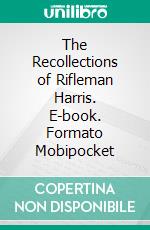THE RECOLLECTIONS OF RIFLEMAN HARRIS - The book which inspired the Sharpe Novels: An Elisted Man's Account of the Peninsula Wars. E-book. Formato PDF - 9788829500741
di Benjamin Harris
edito da ABELA PUBLISHING , 2018
Formato: PDF - Protezione: Filigrana digitale
The book which inspired the Sharpe Novels!
Just as in the Sharpe Novels by Bernard Cornwell, the Prince’s Own 95th Rifles was a real regiment, and there was a real Rifleman Harris for it is his recollections which are published in this volume.
There was indeed a soldier who joined the rifles and was soon made a sergeant. By the end of the wars he had, unusually, risen to be a commissioned officer (see Ch. XV.). It is believed that it is this story which inspired the character of Richard Sharpe.
Harris’ story starts after he had been recruited and was now, in-turn, on a recruiting drive. In this volume he recounts anecdotes about his officers; believe me all enlisted men have such stories about their officers. He also recounts occurrences of desertion and the penalties if caught, cases of treachery and accounts of camaraderie. There is even an account of how he held a perfectly rational conversation with a fellow rifleman during the heat of battle, no easy feat when you’re using a muzzle loader. All of these are retold at some point during the Sharpe Novels.
Also recorded are the battles in which the part he, and the 95th, took part. Here you can read of the battles of Roliça, Vimiero, Salamanca and the retreat to Corunna.
Read also of the stories of “A cobbler and the cannon ball”, “A lubberly artilleryman”, “Major Travers and his wig” and how the 95th routed Boney's Invincibles.
If a soldier survived the Peninsula War, he would have had the opportunity to augment his meagre wages by plundering what items of value the enemy left behind. In many cases this meant picking over the dead. Hence there was the opportunity to finish the war a lot wealthier than he could have imagined.
The camp followers, the wives and common-law wives of the soldiers, were also allowed to pick over the dead at the end of each battle. In most cases it would mean salvaging brass buttons and belts. If they were lucky they may find an officer’s sword or pistol. Many would convert their pickings to cash, or use them to trade, for food for themselves and any children they may have with them.
Harris himself was illiterate. He is thought to have been born in Portsea, Portsmouth into a family of shepherds and this was his way of life until he joined the army in 1803. After the war he worked as a cobbler, a trade he is thought to have learned whilst in the army. His recollections were recorded for him, after the war, at some stage in the middle of the 1830s by an officer who knew him, Captain Henry Curling, editor of this volume. Curling then kept the manuscript until 1848, when he succeeded in getting it published.
So, we invite you to download this very interesting, first-hand account, of an enlisted man who inspired the story of Richard Sharpe and the Sharpe Novels.
===============
HISTORICAL NOTE: The Prince’s Own 95th underwent a few reinventions and amalgamations during the Peninsula Wars ending the Napoleonic wars as The Rifle Brigade.
They were still in existence during WWI and at the outbreak of WWII they were part of The 1st Battalion, Rifle Brigade and performed with distinguished service during both World Wars.
On 1 January 1966 the regiment was amalgamated with the 1st Green Jackets (43rd and 52nd) and the King's Royal Rifle Corps to form The Royal Green Jackets.
The 1st Battalion The Royal Green Jackets' final operation was in Basra, Iraq, on Operation Telic in 2006/7. Thereafter they were reorganised and amalgamated in 2007 with a few other regiments to become The Rifles.
===============
KEYWORDS/TAGS: Rifleman Harris, Peninsula Wars, Napoleon, Boney, Richard Sharpe, Bernard Cornwell, Duke of Wellington
Just as in the Sharpe Novels by Bernard Cornwell, the Prince’s Own 95th Rifles was a real regiment, and there was a real Rifleman Harris for it is his recollections which are published in this volume.
There was indeed a soldier who joined the rifles and was soon made a sergeant. By the end of the wars he had, unusually, risen to be a commissioned officer (see Ch. XV.). It is believed that it is this story which inspired the character of Richard Sharpe.
Harris’ story starts after he had been recruited and was now, in-turn, on a recruiting drive. In this volume he recounts anecdotes about his officers; believe me all enlisted men have such stories about their officers. He also recounts occurrences of desertion and the penalties if caught, cases of treachery and accounts of camaraderie. There is even an account of how he held a perfectly rational conversation with a fellow rifleman during the heat of battle, no easy feat when you’re using a muzzle loader. All of these are retold at some point during the Sharpe Novels.
Also recorded are the battles in which the part he, and the 95th, took part. Here you can read of the battles of Roliça, Vimiero, Salamanca and the retreat to Corunna.
Read also of the stories of “A cobbler and the cannon ball”, “A lubberly artilleryman”, “Major Travers and his wig” and how the 95th routed Boney's Invincibles.
If a soldier survived the Peninsula War, he would have had the opportunity to augment his meagre wages by plundering what items of value the enemy left behind. In many cases this meant picking over the dead. Hence there was the opportunity to finish the war a lot wealthier than he could have imagined.
The camp followers, the wives and common-law wives of the soldiers, were also allowed to pick over the dead at the end of each battle. In most cases it would mean salvaging brass buttons and belts. If they were lucky they may find an officer’s sword or pistol. Many would convert their pickings to cash, or use them to trade, for food for themselves and any children they may have with them.
Harris himself was illiterate. He is thought to have been born in Portsea, Portsmouth into a family of shepherds and this was his way of life until he joined the army in 1803. After the war he worked as a cobbler, a trade he is thought to have learned whilst in the army. His recollections were recorded for him, after the war, at some stage in the middle of the 1830s by an officer who knew him, Captain Henry Curling, editor of this volume. Curling then kept the manuscript until 1848, when he succeeded in getting it published.
So, we invite you to download this very interesting, first-hand account, of an enlisted man who inspired the story of Richard Sharpe and the Sharpe Novels.
===============
HISTORICAL NOTE: The Prince’s Own 95th underwent a few reinventions and amalgamations during the Peninsula Wars ending the Napoleonic wars as The Rifle Brigade.
They were still in existence during WWI and at the outbreak of WWII they were part of The 1st Battalion, Rifle Brigade and performed with distinguished service during both World Wars.
On 1 January 1966 the regiment was amalgamated with the 1st Green Jackets (43rd and 52nd) and the King's Royal Rifle Corps to form The Royal Green Jackets.
The 1st Battalion The Royal Green Jackets' final operation was in Basra, Iraq, on Operation Telic in 2006/7. Thereafter they were reorganised and amalgamated in 2007 with a few other regiments to become The Rifles.
===============
KEYWORDS/TAGS: Rifleman Harris, Peninsula Wars, Napoleon, Boney, Richard Sharpe, Bernard Cornwell, Duke of Wellington
Ean
9788829500741
Titolo
THE RECOLLECTIONS OF RIFLEMAN HARRIS - The book which inspired the Sharpe Novels: An Elisted Man's Account of the Peninsula Wars. E-book. Formato PDF
Autore
Editore
Data Pubblicazione
2018
Formato
PDF
Protezione
Filigrana digitale
Punti Accumulabili




